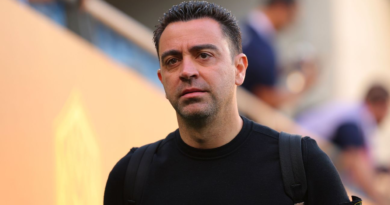USWNT overcomes problematic midfield to beat joyous Germany
The United States women’s national team managed to stop their skid on the world stage with two quick-fire second-half goals to beat Germany on Sunday night in a friendly at Red Bull Arena in Harrison, N.J.
On the back foot from the off, the USA struggled to deal with Germany’s high-intensity play and gave up a goal 18 minutes in, when Jule Brand threaded a low effort into the back of the net. Although the visitors had a raft of chances in the first half, they couldn’t add to their tally.
– Stream on ESPN+: LaLiga, Bundesliga, MLS, more (U.S.)
A snap shot from Sophia Smith 10 minutes into the second half marked a change in the wind for the hosts in their last game of the year. Unable to hold on after they equalized last time out, the USA made no mistakes in Harrison and soon had the lead. Mal Pugh chased down a ball over the top, beating Nicole Anyomi to it as it came down, before stroking the shot home from just inside the area.
Even with a frantic finish to the game, the hosts held out to wrap up the year with a win and finally put an end to their unfavorable results.
JUMP TO: Player ratings | Best/worst performers | Postmatch quotes | Key stats | Upcoming fixtures
Rapid reaction
1. German fluidity brings joy
It has become the norm to look at a German starting XI and have to take a moment to work out just who is in the defense, the team with a long-standing over-reliance on midfielders and attackers to build out the back. Yet, you can see with each game since the summer, the team has found a way of playing with flow. It’s not quite the total football that we associate with Johan Cruyff and Rinus Michels, but it utilizes the same ideas of players moving to cover space, attackers happy to help out in defense and defenders keen to add to the attack.
Germany coach Martina Voss-Tecklenburg made seven changes between the prior game against the U.S. and this one, and the team only improved despite the removal of experience, because of the understanding of the more liquid system from those coming in. Even when the vastly talented 20-year-old Lena Oberdorf had to come off with a shoulder injury in the first half, the team didn’t flinch, despite losing a key player.
When attacking midfielder Dzsenifer Marozsán was injured early in their 2019 World Cup campaign — early in Voss-Tecklenburg’s tenure — the team looked lost for the rest of the tournament; flat in attack and uncharacteristically spineless. But watching this match, there was the sense that it didn’t matter who was actually on the pitch for Germany, they wouldn’t waiver from the task at hand.
2. The problematic American midfield
There’s no getting away from how fond U.S. coach Vlatko Andonovski is of playing three in the middle, indeed it’s something that despite heavy criticism from all angles he has persisted with. The system may well work with a fully fit Sam Mewis and/or Julie Ertz available, but the problem for the coach is that neither are, and Ertz may never be again. So the U.S. persist with Rose Lavelle, Andi Sullivan and Lindsey Horan, even though it leaves the world champions without much structure in the middle of the park.
When the U.S. get forward, so much of the focus is on the front three making things work, taking the flimsy midfield out of the equation in traditional terms. Without the likes of Ertz — who fans will remember always seemed to do the work of two or three players, patrolling and relentlessly mopping up in front of the defense — the American back line has become far more susceptible and likely to be attacked at will. The “easy” solution would be finding another Ertz to fill the void, yet there is no one currently available who does the same, which makes Sullivan look so poorly suited for the job. That’s had many repeatedly crying out for a different shape and the application of a double pivot to add the structure the U.S. are so short on.
The hosts turned the match around in New Jersey thanks to moments of individual magic rather than a change of approach, which raises yet more questions, not least, what Andonovski thinks will happen when the team get their World Cup campaign underway.
3. Girma continues to shine
For all the laboring the U.S. has done in recent matches, for as lost as the players have looked, Naomi Girma is the one who has brought consistency and a defensive understanding that entirely belies her years. Earning just her 10th cap against Germany on Sunday, the center back plays as if she’s in her 10th year in the role, bringing a clear and calm head to the exposed American defense.
After their last match against Germany, I questioned how this USA team was taking shape and who might be on the plane to the World Cup — or rather who was likely to be starting come next summer with Smith looking off color, having previously impressed for her national team. Maybe there are still 10 starting spots up for grabs for the USA, but there can be no question: Girma’s needs to be the first name on the team sheet for the world champions.
Partnered with Alana Cook last game and veteran Becky Sauerbrunn for this outing, the shortcomings of the two defenders she was paired with were only further highlighted by Girma’s complete performances at the back.
Player ratings
United States: Alyssa Naeher 7, Becky Sauerbrunn 5, Naomi Girma 7, Emily Fox 5, Sofia Heurta 6, Lindsey Horan 6, Andi Sullivan 5, Rose Lavelle 6, Alex Morgan 6, Mal Pugh 7, Sophia Smith 7
Subs: Kristie Mewis 5, Taylor Kornieck 6, Hailie Mace 5
Germany: Ann-Katrin Berger 6, Sjoeke Nusken 5, Kathrin Hendrich 5, Sophia Kleinherne 7, Nicole Anyomi 7, Lena Oberdorf 6, Jule Brand 6, Linda Dallmann 5, Alexandra Popp 6, Lena Lattwein 7, Svenja Huth 5
Subs: Chantal Hagel 4, Almuth Schult 5, Lina Magull 5, Carolin Simon 5, Sara Doorsoun-Khajeh 5, Paulina Krumbiegel 6
Best and worst performers
BEST: Naomi Girma, USA. Calm at the back on a chaotic night, Girma once again excelled.
WORST: Chantal Hagel, Germany. Having had a smart cameo in the last game, Hagel looked at odds with herself this time out, her touch and positional play lacking.
After the match: What the players and managers said
Andonovski on the USWNT’s winning adjustments: “… And then we just made another adjustment second half that it felt crucial when we lowered [Horan] just a little bit more to allow [Sullivan] to be more aggressive to step in and win some of those balls. At that point, we started taking the game over and felt very comfortable with it.”
Voss-Tecklenburg: “We had a good start to the game, the 30-plus minutes were really good. They were really present on the pitch and made good decisions, and then we had a cut when Lena was injured, which was hard for the team.”
Key stats (via ESPN Stats & Info)
– Morgan became just the 13th player to reach 200 appearances for the U.S. women’s national team.
– After their win over Germany, the USWNT are now 2W-5L-1D in their past eight games played against teams in the top 10 of FIFA’s women’s rankings.
Up next
United States: The USWNT have a pair of January friendlies in New Zealand to prepare for next summer’s World Cup, taking on the co-hosts Jan. 17 and Jan. 20.
Germany: Germany have no matches scheduled until their World Cup begins on July 24, when they take on Morocco in their tournament opener.




